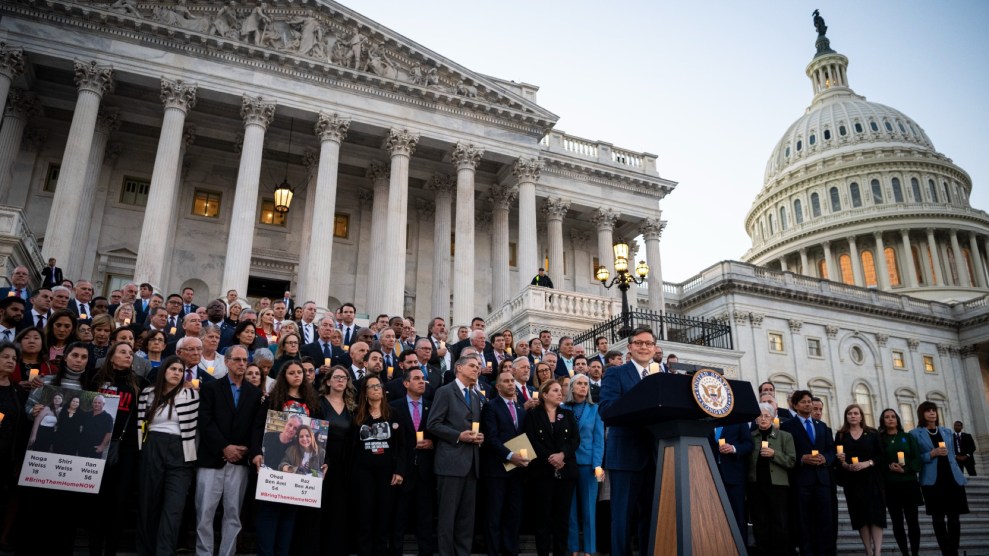
President Joe Biden talks with U.S. Border Patrol agents as they walk along a stretch of the U.S.-Mexico border in El Paso Texas.Andrew Harnik/AP
This week, lawmakers are trying to reach a last-minute agreement on tough immigration and border security proposals tied to a $100 billion legislative package that would provide foreign aid to Ukraine and Israel. The frail deal—being brokered by a bipartisan group of senators led by Chris Murphy (D-Conn.) and James Lankford (R-Okla.)—seems increasingly unlikely to materialize before the end of the year.
Still, the possibility has prompted President Joe Biden to tell press that he would be “willing to make significant compromises on the border.” Several new outlets, including CBS News, have since reported that the administration is considering a number of proposals that would likely appease Republicans clamoring for more border enforcement. Among them would be the use of a Title 42-like authority to summarily expel migrants without hearings; the allowance of mandatory detention of migrants; and the expansion of fast-tracked deportations beyond the border.
During Ukrainian President Volodymyr Zelensky’s visit to Washington this Tuesday, Biden said that “holding Ukraine funding hostage in an attempt to force through an extreme Republican partisan agenda on the border is not how it works.” But it is unclear if that is true.
“Everything I’ve heard over the last 24 hours supports the reports that the White House has agreed in principle to what could be the most anti-immigrant and anti-asylum legislation in almost 30 years,” Aaron Reichlin-Melnick, policy director at the American Immigration Council, posted on X:
Everything I’ve heard over the last 24 hours supports the reports that the White House has agreed in principle to what could be the most anti-immigrant and anti-asylum legislation in almost 30 years.
This is a moment of crisis for immigrant rights. The time to act is now. https://t.co/ashY6mLvay
— Aaron Reichlin-Melnick (@ReichlinMelnick) December 13, 2023
Some of these proposals are not new. “They have been tried and have failed to do exactly what they’re claiming they’re going to do for border security and to decrease the number of people coming,” says Maribel Hernández Rivera, director of policy and government affairs, border and immigration at the American Civil Liberties Union (ACLU).
“These proposals that are on the table are not good faith proposals,” she continued. “They’re about inflicting harm, about cruelty, about separating families. They’re about making sure that we close any possibility for legal pathways and any possibility for refuge.”
Mother Jones spoke with Rivera about the nature of the proposals and what they represent for the US asylum system and immigrant communities.
In the past few weeks, the immigrant rights advocacy community appears to be on crisis mode, alerting the public to the possibility that some of the most draconian and restrictive immigration proposals in years could become legislation. How do you see this current moment?
The proposals that we have been hearing are most definitely some of the most detrimental proposals for immigrant rights. Not only that, they codify what former President Trump and Stephen Miller brought to our nation in the past administration—fear for immigrants. And really: the sake of their policies was for cruelty for cruelty sake.
What we are seeing right now is those proposals being revived and taken seriously. It has never been the case that these policies are taken seriously by people who understand immigrant rights and want to make sure that we have our civil rights and civil liberties. It is really distressing to hear that the White House and Congress are even considering them. We should not be normalizing these type of cruel proposals.
There are three big things happening with these potential measures. One is definitely an attempt at gutting the asylum system. Two: they’re bringing in this state of fear within the United States; people already in the United States are going to be fearful of being removed without having access to a hearing, to a lawyer. And then number three, they’re talking about increasing detention and increasing mass incarceration of immigrants and people who are going through the process.
Those three things are a massive rewriting of our immigration system.
Can you break down for readers of Mother Jones what is problematic about the proposals being floated around with raising standards for asylum?
The way [the asylum system] works right now is that if somebody comes to the United States and they seek asylum, they come into contact with immigration services, they have an initial screening to see whether they have a credible fear. In that credible fear screening, what they are showing is whether or not there’s a significant possibility that [the asylum seeker] if deported will risk persecution on account of a protected ground. We give them the opportunity to go to a court hearing where they can express their case.
But what we have heard about in these proposals is increasing that standard for a credible fear screening from “significant possibility” [of facing persecution] to “more likely than not.”
Asylum hearings and asylum cases are very complex, so what people are showing is they’ve been persecuted—whether it’s been torture, whether it’s been violence—and how their life is at risk if they go back. You need to make sure that [the asylum seeker] has time to prepare their evidence, you need to make sure that they have time to see a lawyer, you need to make sure that they have somebody who can translate. If we change and increase the standards for the initial screening interview, what that means is that many more people who might eventually be able to qualify for asylum if they were given the opportunity to have a hearing—they will no longer have that opportunity. Instead, what’s going to happen is they’re going to be sent back.
Already, some people are coming to our borders are subjected to higher standards [as part of the Biden administration’s restrictions on asylum] and we are seeing the opportunities to present their case in front of a judge are decreasing. However, the number of people who are coming to the border and the number of people who are seeking protection is not decreasing. There is little correlation between increasing the credible fear standards with decreasing the numbers at the border.
Besides raising the standards for that initial asylum screening interview, one of the proposals reportedly under consideration would be to bring back a Title 42-like authority to allow US officials to summarily expel migrants, even without the semblance of a public health imperative. What would the impact be of reviving something akin to Title 42?
Title 42 is a Trump-era policy clearly brought by Stephen Miller. I was at the border when Title 42 ended and I saw the consequences of that policy. Even people who might have an asylum claim and might eventually be able to get asylum if given the opportunity to have a hearing, those people were just immediately being expelled. They had zero opportunity to express their case to anybody. Title 42 sent people back to places where they were in danger. We saw people at the Mexico border in camps that had no running water.
To bring back an expulsion authority that is similar to Title 42 is unconscionable. It blows your mind to think: Is that what we are considering after we saw the consequences? It should not even be on the table.
Yet another proposal has to do with mandatory detention for new border arrivals, but there’s general agreement that the United States doesn’t have the capacity to detain all migrants. What would that look like in practice given that reality?
It’s a simple visual: sprawling detention camps. Detention camps everywhere. It has been shown that if asylum seekers get processed and are let go into their communities, they will come back to [immigration] court. There’s data that shows that, so there’s no need to detain people. What has happened when we have seen these detention camps has been the separation of families, the separation of children, and then mass deportations without people having access to a lawyer.
The other really important thing is: Who does this profit? It profits private prison companies because currently our immigration detention centers are mostly run by private companies. Private companies should not be profiting from the suffering and the separation of families.
By building mass detention camps, what are we doing? Well, now we’re building the infrastructure that a future Trump presidency can just use to put all of the immigrants in one place. We have seen what Trump is saying he’s going to do if he’s elected again. So at the moment when we know he is calling for mass deportations, mass raids, for terrorizing immigrant communities—why would we create the infrastructure to allow him to do so?
We’ve also heard about the possibility of expanding what’s called expedited removal, or fast-track deportations, nationwide.
That idea of having a nationwide expedited removal came from President Trump and Stephen Miller. It’s faster deportation, where people are order removed from the United States without basic due process. People don’t have access to a court hearing, people don’t have access to an attorney; people pretty much have no recourse if there’s an incorrect deportation. We have seen people being erroneously deported—US citizens, people who have been seeking asylum, residents, unaccompanied children. The mistake is not a minimal mistake. The mistake is life or death. And this resulted in terror to immigrant communities. People were afraid of leaving their houses because of such policies. The people who will be affected will be immigrant communities, but it will also be brown and Black people whether or not they are immigrants because what happens is racial profiling.
The White House is showing willingness to make compromises and concessions to Republican lawmakers’ demands. Is it the case that the Biden administration is caving in to political pressure on this issue?
Unfortunately, although this administration began by providing proposals that would give a pathway to citizenship for people who are in the United States and used the parole process to allow a lot of people to have legal pathways, at the same time, we have seen this administration capitulate to anti-immigrant proposals.
When President [Biden] was elected, he said people should not be in cages, that is still the case. We should not have private detention. We should not be turning away people who are coming to our borders seeking refuge before we give them an opportunity to present a case.
He was going to make sure that our asylum system was strong, which was different from what the previous administration did. The previous administration tried to eviscerate our asylum system. President Biden began by saying: No, that’s not what’s going to happen; we are a nation that believes in the humanity of immigrants, that is going to make sure that we’re abiding by both international and US laws. That should not change.
What’s happening, which is surprisingly distressing, more than anything, is basically the congressional leadership in the White House is holding a far-right extremist position. What has happened? I don’t know. But what I can tell you is that immigrants are still human beings.
This conversation has been edited for length and clarity.

















